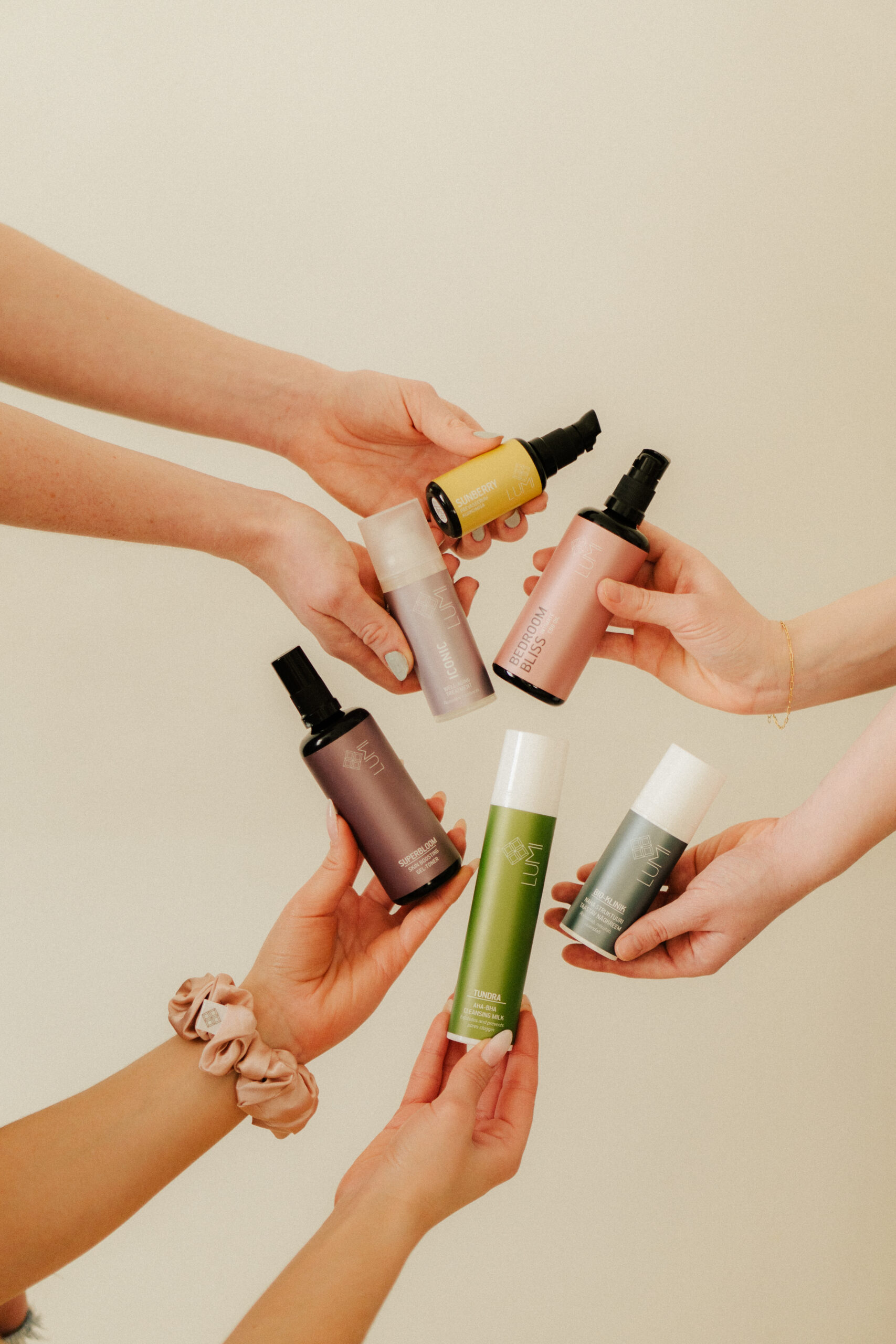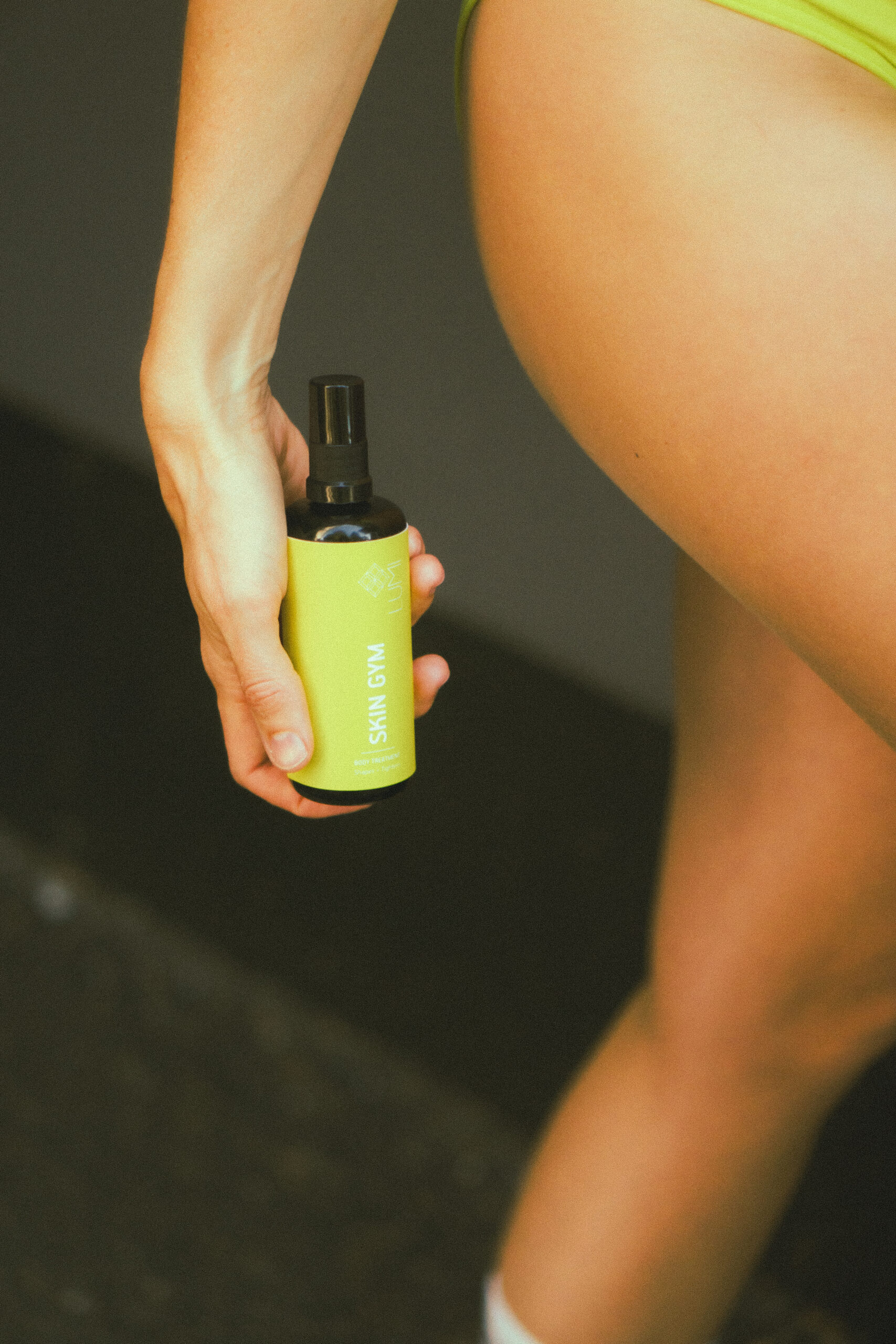Our Skin Microbiome Deserves Better: Towards A New Future of UV Protection with LUMI!
Part 2 of our article series on the importance of the microbiome!
Photodamage is the eternal scourge of those looking to slow down skin aging. We used to think that as long as we weren’t burning, the sun wasn’t having an effect on our skin (other than giving us that luscious tan we crave, of course!). Science has made it clear over the past few decades, however, that even mild sun exposure leads to premature aging of the skin.
Put simply, the more time we spend in the sun, the more our skin ages. It’s estimated that UV exposure is responsible for around 80% of visible signs of facial aging. Consequently, it’s vital that we use protection when out in the sun, such as that provided by SPF creams and similar products.
But SPF creams often leave a lot to be desired, not least in their potential impact on the environment and the questions surrounding prolonged exposure to certain ingredients, particularly in nano-form. That’s why we always say that it’s vital to seek out sustainable, organic SPF suncreams!
Yet even the best SPF cream will no doubt leave one key skincare factor totally ignored – the skin’s microbiome. In recent years, research has shown us that this trillions-strong community of microscopic organisms that live on the skin’s surface have a hugely beneficial impact on our health, whether by protecting us from pathogens, assisting with skin repair, or by helping us resist premature skin aging.
Despite the microbiome’s importance, the impact of UV exposure on its health is not often discussed in the skincare industry, and there are virtually no solutions specifically designed to protect our skin’s microbial community.
Here at LUMI, we think that it’s high time that changed! We’ve searched far and wide for innovative natural solutions for the microbiome, and have unearthed some truly brilliant cutting-edge ingredients to put into our new Sunbrero SPF-boosting Essence. But more on that later!
First, let’s take a look at the microbiome, the effects that UV radiation has on the microflora that live there, and what we might be able to do to aid these essential microbes, so they can return the favour!
The Sun’s Effect on the Skin Microbiome
As a fan of LUMI, we’re sure you already know all about the skin microbiome. But just in case you’re new around here, let’s have a quick refresher; the skin microbiome is the name given to the trillions of microscopic organisms that live on the surface of our skin, including bacteria, fungi, and even viruses!
These microorganisms have evolved over millions of years to live in harmony with humans. The relationship is synergistic in nature – we provide a home and source of nutrients for microbiota, and in turn, these microbiota convey all sorts of benefits to our skin. These pluses include helping protect, moisturise, and repair our skin, as well as playing a role in preventing premature aging and stopping pollutants from reaching our bodies.
Truly, the microbiome is one of our skin’s greatest assets! But unfortunately, despite its strengths, the microbiome has a serious vulnerability that it shares with its host – UV radiation.
We actually know that our microbiome has a few clever tricks up its sleeve to try and cope with sun exposure, such as producing its own melanin and antioxidant compounds, and has been shown to assist the skin in protecting skin cells from damage. This may mitigate some of the impact of UV radiation, but it is not enough when presented with continued exposure.
A 2024 academic review of several studies came to some revealing conclusions about the impact of sun (and sun protection) on our skin microbiome. The review found that UV radiation has clear bactericidal (bacteria-killing) effects, and that because different bacteria have varying resistances and will thus die at different rates, UV radiation can destroy the fine balance of the microbiome.
The review also found that sunscreen itself, with its antimicrobial ingredients, can also disrupt the balance of the microbiome, allowing some bacteria to become too prominent, and other helpful bacteria to be minimised. This is not ideal, because as we know, the impact of not wearing sunscreen can be even worse.
If we look at everything we’ve learnt so far then, the way forward becomes clear. We know that people who spend time in the sun need to use sunscreen or similar products to avoid photoaging, but we also understand that sunscreen does little to protect the skin microbiome and can also disrupt its balance.
This means that, as a complement to SPF creams, we need a solution that can help protect and rebalance the microbiome. Well, dear reader, we have just the thing. Introducing… Sunbrero!
Protect the Microbiome, So It Can Protect You!
Sunbrero SPF-Boosting Essence combines some of the most state-of-the-art ingredients in organic biochemistry with tried-and-tested remedies that have been utilised for millennia. The result? A truly innovative day serum that helps protect your skin and its microbiome from the effects of UV radiation!
We searched high and low for active ingredients that could help the microbiome resist UV damage and help rebalance the bacterial make-up of skin. Our search proved more fruitful than we could ever imagine, leading us to the brilliantly innovative Vytrus Biotech in Barcelona. Their pioneering plant stem cell research has led to the creation of several revolutionary active ingredients that focus on the microbiome.
Photobiome™ prebiotics are a godsend for the microorganisms on your skin’s surface, inducing microbes to engage their own inherent photo-defence mechanisms, resulting in far more surviving UV radiation than under usual circumstances. This means that the microbiome can focus on helping your skin heal from photodamage, rather than trying to heal or rebalance itself!
To address any imbalance that does occur, we have another plant stem cell-derived active. This probiotic hacks into the chemical-based communication channels of bacteria, ensuring the propagation of beneficial bacteria and minimising the spread of harmful microbes. It’s a high-tech, completely natural skin saviour!
To round things off, we’ve also included a few compounds that are proven to assist skin in its fight against photodamage.
Aloe vera has been utilised in skincare for thousands of years, thanks to its soothing anti-inflammatory and antioxidant properties. Melatonin is a similarly potent antioxidant, and recent research has shown that the compound also inhibits cell deterioration and melanin production by reducing the effects of UV irradiation on DNA!
Mix these four incredible ingredients together and you get a truly amazing day serum that addresses key needs of your skin and its microflora. So, this summer, make sure you give your skin and its microbiome the best protection possible by packing Sunbrero alongside your SPF cream!
Want to keep your microbiome in tip-top shape so it can continue to help protect and nourish your skin? Click here to be taken straight to our Sunbrero product page. After something else? Check out our entire rage of microbiome-friendly, science-backed skincare solutions right here!
References:
-
Amaro-Ortiz, A., Yan, B., & D’Orazio, J. A. (2014). Ultraviolet radiation, aging and the skin: prevention of damage by topical cAMP manipulation. Molecules (Basel, Switzerland), 19(5), 6202–6219. https://doi.org/10.3390/molecules19056202
-
Bocheva, G., Slominski, R. M., Janjetovic, Z., Kim, T. K., Böhm, M., Steinbrink, K., Reiter, R. J., Kleszczyński, K., & Slominski, A. T. (2022). Protective Role of Melatonin and Its Metabolites in Skin Aging. International journal of molecular sciences, 23(3), 1238. https://doi.org/10.3390/ijms23031238
-
Boxberger, M., Cenizo, V., Cassir, N., et al., (2021). Challenges in exploring and manipulating the human skin microbiome. Microbiome, 9, 125. https://doi.org/10.1186/s40168-021-01062-5
-
Byrd, A. L., Belkaid, Y., & Segre, J. A. (2018). The human skin microbiome. Nature Reviews Microbiology, 16(3), 143–155. https://doi.org/10.1038/nrmicro.2017.157
-
Flament, F., Bazin, R., Laquieze, S., Rubert, V., Simonpietri, E., & Piot, B. (2013). Effect of the sun on visible clinical signs of aging in Caucasian skin. Clinical, cosmetic and investigational dermatology, 6, 221–232. https://doi.org/10.2147/CCID.S44686
-
Grant, G. J., Kohli, I., & Mohammad, T. F. (2024). A narrative review of the impact of ultraviolet radiation and sunscreen on the skin microbiome. Photodermatology, photoimmunology & photomedicine, 40(1), e12943. https://doi.org/10.1111/phpp.12943
-
Kolbe, L., Pissavini, M., Tricaud, C., Trullás Cabanas, C., Dietrich, E., & Matts, P. J. (2019). Anti-inflammatory / anti-oxidant activity of ingredients of sunscreen products? Implications for SPF. International journal of cosmetic science, 41(3), 320–324. https://doi.org/10.1111/ics.12540
-
Ma, L. P., Liu, M. M., Liu, F., Sun, B., Wang, S. N., Chen, J., Yu, H. J., Yan, J., Tian, M., Gao, L., & Liu, Q. J. (2023). Melatonin inhibits senescence-associated melanin pigmentation through the p53-TYR pathway in human primary melanocytes and the skin of C57BL/6 J mice after UVB irradiation. Journal of molecular medicine (Berlin, Germany), 101(5), 581–593. https://doi.org/10.1007/s00109-023-02301-y
-
Patra, V., Byrne, S. N., & Wolf, P. (2016). The Skin Microbiome: Is It Affected by UV-induced Immune Suppression? Frontiers in microbiology, 7, 1235. https://doi.org/10.3389/fmicb.2016.01235
-
Patra, V., Wagner, K., Arulampalam, V., & Wolf, P. (2019). Skin Microbiome Modulates the Effect of Ultraviolet Radiation on Cellular Response and Immune Function. iScience, 15, 211–222. https://doi.org/10.1016/j.isci.2019.04.026
-
Rusanova, I., Martínez-Ruiz, L., Florido, J., Rodríguez-Santana, C., Guerra-Librero, A., Acuña-Castroviejo, D., & Escames, G. (2019). Protective Effects of Melatonin on the Skin: Future Perspectives. International journal of molecular sciences, 20(19), 4948. https://doi.org/10.3390/ijms20194948
-
Sánchez, M., González-Burgos, E., Iglesias, I., & Gómez-Serranillos, M. P. (2020). Pharmacological Update Properties of Aloe Vera and its Major Active Constituents. Molecules (Basel, Switzerland), 25(6), 1324. https://doi.org/10.3390/molecules25061324
-
Vytrus Biotech. (2024). Photobiome™ – The microbiota photoprotector. https://www.vytrus.com/natural-active/photobiome/

